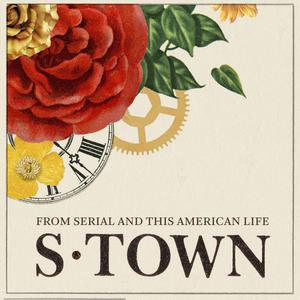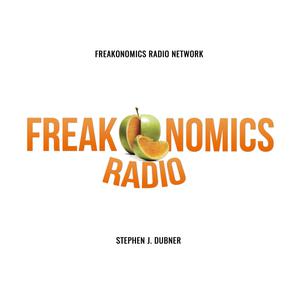
Lucky Words
Jeffrey Windsor
During April, which is National Poetry Month, I will be reading and discussing a poem every day. Each day, I will try to record in a new, interesting location outdoors: on a trail or a mountain or in the desert.
- 7 minutes 28 secondsEpisode 4.17 Kay Ryan’s “This Life”
Recorded live on location at... my backyard. It was a lovely morning, and so I decided to read a poem. I didn't mention it in the recording because, well because I didn't think about it. I was thinking about Ryan's great poem. And so I recorded a nice short podcast about it.
I love this poem. It's one that I've copied out, longhand, in my own notebook that I'm carrying around right now. It's nice and short, for one, and it's fun to read out loud. "It's a pickle, this life" is a great opener, and everyone knows that "pickle" is one of the funniest words in English. Most critically, it's got some intellectual oomph to it as well, and is good for me to think about a while.
Since recording this, I've been thinking a lot more about the contrast between the jolly rhyme and the seriousness of what Ryan's talking about. The unextinguishable component of life, according to the poem, is strife. So when life is nearly gone ("shut down to a trickle") there's still the particles of suffering in it. And while the trials may shrink, they are still more than enough to eat you. _And yet_ there's something great in it, too. It's life, after all. We never reach the end, only cut the remainder in half (again!), even while we are encouraged by some coach to just end the race, we don't. And so while strife is always there, so it life itself. And that's pretty great, I think.
What do you think? Is this poem hopeless or ultimately hopeful? Also, what word is more fun than "pickle"?
#### TEXT OF POEM
"This Life" by Kay Ryan
It's a pickle, this life.
Even shut down to a trickle
it carries every kind of particle
that causes strife on a grander scale:
to be miniature is to be swallowed
by a miniature whale. Zeno knew
the law that we know: no matter
how carefully diminished, a race
can only be _half_ finished with success;
then comes the endless halving of the rest --
the ribbon's stalled approach, the helpless
red-faced urgings of the coach.
21 April 2023, 2:00 pm - 12 minutes 38 secondsEpisode 4.16 Three Poems by Stephen Crane
Recorded on West Mountain, just west of Spanish Fork, Utah. It was blustery and cold, but kind of weirdly beautiful regardless. Beautiful in its desolate ugliness, I guess.
The painting I mentioned is indeed by Francisco Goya, but I got the name of the painting wrong. It is "Saturn Eating His Children" which you can see and read about [here](https://en.wikipedia.org/wiki/Saturn_Devouring_His_Son). It's still a perfect painting to accompany this, I think.
I will be sending out a weekly email soon. Please sign up below so you can keep up on things (poetry!).
#### TEXT OF POEMS
Three poems by Stephen Crane
**"I Saw A Man Pursuing the Horizon"**
I saw a man pursuing the horizon;
Round and round they sped.
I was disturbed at this;
I accosted the man.
"It is futile," I said,
"You can never --"
"You lie," he cried,
And ran on.
**"In the Desert"**
In the desert
I saw a creature, naked, bestial,
Who, squatting upon the ground,
Held his heart in his hands,
And ate of it.
I said, "Is it good, friend?"
"It is bitter--bitter," he answered;
"But I like it
"Because it is bitter,
"And because it is my heart."
**"In Heaven"**
In Heaven,
Some little blades of grass
Stood before God.
"What did you do?"
Then all save one of the little blades
Began eagerly to relate
The merits of their lives.
This one stayed a small way behind
Ashamed.
Presently God said:
"And what did you do?"
The little blade answered: "Oh, my lord,
"Memory is bitter to me
"For if I did good deeds
"I know not of them."
Then God in all His splendor
Arose from His throne.
"Oh, best little blade of grass," He said.
21 April 2023, 1:23 am - 13 minutes 32 secondsEpisode 4.15 Wordsworth's "Lines Written in Early Spring"
Recorded by the shore of Utah Lake on a windy but pleasant day, though not as pleasant as what Wordsworth described what with his green bower and all. My favorite part of this recording is the sounds of the killdeer, which I wish were louder, but of course every time I got close they decided to fly away.
#### TEXT OF POEM
"Lines Written in Early Spring" by William Wordsworth
I heard a thousand blended notes,
While in a grove I sate reclined,
In that sweet mood when pleasant thoughts
Bring sad thoughts to the mind.
To her fair works did Nature link
The human soul that through me ran;
And much it grieved my heart to think
What man has made of man.
Through primrose tufts, in that green bower,
The periwinkle trailed its wreaths;
And 'tis my faith that every flower
Enjoys the air it breathes.
The birds around me hopped and played,
Their thoughts I cannot measure:--
But the least motion which they made
It seemed a thrill of pleasure.
The budding twigs spread out their fan,
To catch the breezy air;
And I must think, do all I can,
That there was pleasure there.
If this belief from heaven be sent,
If such be Nature's holy plan,
Have I not reason to lament
What man has made of man?
19 April 2023, 3:53 am - 10 minutes 23 secondsEpisode 4.14 Walter Scott’s “Innominatus”
Recorded on the Watchman Overlook in Zion National Park. There are always too may people at Zion, but I found a spot where I could have some quiet privacy and record a poem. Unfortunately, technology was conspiring against me, and so this sounds kinda lousy. Sorry.
Also, I referred to the trail as "The Watchman" but what I meant was the Watchman _Overlook_: a much less ambitious undertaking.
This is another one of those poems that is popular with people who don't really like poetry. That's not fair, even if Walter Scott kinda deserves his reputation.
It makes me sad that my own children have very little positive to say about the United States. This is where they were born and where they have always lived, and I want them to love it (even if they're not big fans of the government or the political parties). I grew up saying the Pledge of Allegiance, and I think it made an impact on my thinking. I am a pretty standard educated-liberal guy, who votes with the bloc of educated-liberal people -- but I refuse to give up the symbol of the flag to other people. I refuse to make patriotism a partisan issue.
Which is kind of funny that my analysis of this poem focuses on the landscape more than the government.
#### TEXT OF POEM
"Innominatus," by Sir Walter Scott
Breathes there the man with soul so dead,
Who never to himself hath said,
"This is my own, my native land!"
Whose heart hath ne'er within him burn'd
As home his footsteps he hath turn'd
From wandering on a foreign strand?
If such there breathe, go, mark him well;
For him no Minstrel raptures swell;
High though his titles, proud his name,
Boundless his wealth as wish can claim;
Despite those titles, power, and pelf,
The wretch, concentred all in self,
Living, shall forfeit fair renown,
And, doubly dying, shall go down
To the vile dust from whence he sprung,
Unwept, unhonour'd, and unsung.
18 April 2023, 3:54 am - 10 minutes 23 secondsEpisode 4.13 Thomas Hardy’s “The Convergence of the Twain"
Recorded in a tiny little canyon that I never learned the name for, but it was peaceful and quiet. Everyone should have a peaceful, quiet little place to read a poem every now and again.
As I mention in the commentary, this is interesting because it's simultaneously modern -- I mean, it's talking about an event in the 20th century! -- but also has something older about it. All of Thomas Hardy does, I think, and this in particular. We don't worry much about the role that Fates play in our lives these days.
#### TEXT OF POEM
"The Convergence of the Twain" by Thomas Hardy
(Lines on the loss of the "Titanic")
I
In a solitude of the sea
Deep from human vanity,
And the Pride of Life that planned her, stilly couches she.
II
Steel chambers, late the pyres
Of her salamandrine fires,
Cold currents thrid, and turn to rhythmic tidal lyres.
III
Over the mirrors meant
To glass the opulent
The sea-worm crawls -- grotesque, slimed, dumb, indifferent.
IV
Jewels in joy designed
To ravish the sensuous mind
Lie lightless, all their sparkles bleared and black and blind.
V
Dim moon-eyed fishes near
Gaze at the gilded gear
And query: "What does this vaingloriousness down here?" ...
VI
Well: while was fashioning
This creature of cleaving wing,
The Immanent Will that stirs and urges everything
VII
Prepared a sinister mate
For her -- so gaily great --
A Shape of Ice, for the time far and dissociate.
VIII
And as the smart ship grew
In stature, grace, and hue,
In shadowy silent distance grew the Iceberg too.
IX
Alien they seemed to be;
No mortal eye could see
The intimate welding of their later history,
X
Or sign that they were bent
By paths coincident
On being anon twin halves of one august event,
XI
Till the Spinner of the Years
Said "Now!" And each one hears,
And consummation comes, and jars two hemispheres.
15 April 2023, 6:09 pm - 10 minutes 29 secondsEpisode 4.12 W. H. Auden’s “Musee des Beaux Arts”
Recorded sitting next to some trickling water just outside the mouth of Hellhole Canyon, in Ivins, Utah. In part, my analysis was a chance for me to talk a little about my process in reading a poem—the messy stuff that gets cut out in my editing.
Because not only do I typically record things in a single take and live on a hike, I also don't use any notes or any script. I have, of course, read and thought about the poem, but I don't have a written plan: I read the poem and then talk about it, just like I would if you were on the hike with me. What happens in editing is that I take out long pauses where I think, or I remove false starts. Sometimes I'll get two minutes into an idea and then realize that what I'm talking about is invalidated by a word or phrase that I hadn't understood before.
That's how it goes with many things, isn't it? We start off with a rough idea about where we are headed, but only along the way do we actually figure it out. If you don't believe me, [take Alan Jacobs's word for it](https://blog.ayjay.org/my-writing-advice/).
Anyway, that's my process.
For this poem in particular, you might be interested in [seeing the painting that Auden is talking about](https://www.bl.uk/collection-items/landscape-with-the-fall-of-icarus).
#### TEXT OF POEM
"Musée des Beaux Arts" by W. H. Auden
_December 1938_
About suffering they were never wrong,
The Old Masters: how well they understood
Its human position; how it takes place
While someone else is eating or opening a window or just walking dully along
How, when the aged are reverently, passionately waiting
For the miraculous birth, there always must be
Children who did not specially want it to happen, skating
On a pond at the edge of the wood:
They never forgot
That even the dreadful martyrdom must run its course
Anyhow in a corner, some untidy spot
Where the dogs go on with their doggy life and the torturer's horse
Scratches its innocent behind on a tree.
In Brueghel's _Icarus_, for instance: how everything turns away
Quite leisurely from the disaster; the ploughman may
Have heard the splash, the forsaken cry,
But for him it was not an important failure; the sun shone
As it had to on the white legs disappearing into the green
Water; and the expensive delicate ship that must have seen
Something amazing, a boy falling out of the sky
Had somewhere to get to and sailed calmly on.
15 April 2023, 5:46 am - 11 minutes 31 secondsEpisode 4.11 Jim Harrison’s “I Believe”
A reading and short analysis of Jim Harrison's poem, recorded live in [Hellhole canyon](https://hikestgeorge.com/hiking-trails/hellhole-canyon/), outside St. George, Utah.
#### TEXT OF POEM
"I Believe" by Jim Harrison, from his book [_In Search of Small Gods_](https://www.amazon.com/Search-Small-Gods-Jim-Harrison/dp/1556593198)
I believe in steep drop-offs, the thunderstorm across the lake
in 1949, cold winds, empty swimming pools,
the overgrown path to the creek, raw garlic,
used tires, taverns, saloons, bars, gallons of red wine,
abandoned farmhouses, stunted lilac groves,
gravel roads that end, brush piles, thickets, girls
who haven't quite gone totally wild, river eddies,
leaky wooden boats, the smell of used engine oil,
turbulent rivers, lakes without cottages lost in the woods,
the primrose growing out of a cow skull, the thousands
of birds I've talked to all of my life, the dogs
that talked back, the Chihuahuan ravens that follow
me on long walks. The rattler escaping the cold hose,
the fluttering unknown gods that I nearly see
from the left corner of my blind eye, struggling
to stay alive in a world that grinds them underfoot.
13 April 2023, 7:15 pm - 12 minutes 36 secondsEpisode 4.10 E. E. Cummings “sweet spring is your,” “old mr ly,” and “pity this busy monster,manunkind”
Three poems (more than two!) poems by E. E. Cummings recorded on the shore of the Virgin River in northern Arizona, at the edge of the Mojave Desert. I was sitting on a big, jutting chunk of red sandstone, surrounded by Joshua trees and cacti.
These three poems are of varying levels of difficulty, but for today, the only one that gets the double treatment is "sweet spring is your."
One thing I didn't mention—because I am a man with great self-control—is that I can't read "viva sweet love" without thinking of Elvis singing "Viva Las Vegas." And maybe that's why I chose this poem, sitting just a long stone's throw from the road that would take me there. I can imagine Elvis singing a song with these lyrics, and it would have been a classic.
Instead, I discovered "sweet spring is your" from this album ([Apple Music](https://music.apple.com/us/album/the-rain-is-a-handsome-animal-17-songs-from-the-poetry/547639841), [Spotify](https://open.spotify.com/album/6CyUWx6roy1SbW0AjS0MnN)) by the acoustic chamber quarter (formerly trio) [Tin Hat](http://www.tinhattrio.com).
### TEXT OF POEMS
All the following are by E. E. Cummings and published in _1x1 [One times one]_ (1944), which is also included in his [Complete Poems, 1904-1962](https://www.amazon.com/Cummings-Complete-Poems-1904-1962/dp/1631490419)
**LI**
"sweet spring is your
time is my time is our
time for springtime is lovetime
and viva sweet love"
(all the merry little birds are
flying in the floating in the
very spirits singing in
are winging in the blossoming)
lovers go and lovers come
awandering awondering
but any two are perfectly
alone there's nobody else alive
(such a sky and such a sun
i never knew and neither did you
and everybody never breathed
quite so many kinds of yes)
not a tree can count his leaves
each herself by opening
but shining who by thousands mean
only one amazing thing
(secretly adoring shyly
tiny winging darting floating
merry in the blossoming
always joyful selves are singing)
"sweet spring is your
time is my time is our
time for springtime is lovetime
and viva sweet love"
**XXVII**
old mr ly
fresh from a fu
ruddy as a sun
with blue true two
man
neral
rise
eyes
"this world's made 'bout
right it's the people that
abuses it you can git
anything you like out
of it if
you gut a mind
to there's something
for everybody it's a"
old mr lyman
ruddy as a sunrise
fresh with blue come
true from
a funeral
eyes
"big
thing"
**DXIV**
pity this busy monster,manunkind,
not. Progress is a comfortable disease:
your victim(death and life safely beyond)
plays with the bigness of his littleness
—electrons deify one razorblade
into a mountainrange;lenses extend
unwish through curving wherewhen till unwish
returns on its unself.
A world of made
is not a world of born—pity poor flesh
and trees,poor stars and stones,but never this
fine specimen of hypermagical
ultraomnipotence. We doctors know
a hopeless case if—listen:there's a hell
of a good universe next door;let's go
***
Comments, feedback, suggestions, complaints? [Send 'em my way](mailto:[email protected]).
12 April 2023, 8:15 pm - 15 minutes 32 secondsEpisode 4.09 An Easter reading of Rudyard Kipling’s “A Nativity”
Recorded on site at the tiny, old cemetery in Charleston, Utah. Some of my ancestors are buried there, which makes it relevant for me at least, on this particular day.
You can find some interesting commentary about what Kipling might have been thinking about while composing this poem on [the Kipling Society page about this poem](https://www.kiplingsociety.co.uk/readers-guide/rg_nativity1.htm). It talks much more about World War I and the death of Kipling's son Joseph—all things that I did not discuss.
Because it's Easter! The poem works as a straight religious poem even without its historical context. The historical context is one way of reading the poem, but by no means the only way.
Different ways to read poems is the subject for another day. For today, Easter, the celebration of Christ's resurrection, we're going to stick with a Christocentric reading. Anyway, the solely historical reading of "A Nativity" must simply ignore the final lines of the poem, which feels like a greater disservice from my perspective.
#### TEXT OF POEM
"A Nativity" by Rudyard Kipling
_The Babe was laid in the Manger
Between the gentle kine—
All safe from cold and danger—_
"But it was not so with mine,
(With mine! With mine!)
"Is it well with the child, is it well?"
The waiting mother prayed.
"For I know not how he fell,
And I know not where he is laid."
_A Star stood forth in Heaven;
The Watchers ran to see
The Sign of the Promise given--_
"But there comes no sign to me.
(To me! To me!)_
"My _child died in the dark.
Is it well with the child, is it well?
There was none to tend him or mark,
And I know not how he fell."
_The Cross was raised on high;
The Mother grieved beside—_
"But the Mother saw Him die
And took Him when He died.
(He died! He died!)
"Seemly and undefiled
His burial-place was made—
Is it well, is it well with the child?
For I know not where he is laid."
_On the dawning of Easter Day
Comes Mary Magdalene;
But the Stone was rolled away,
And the Body was not within—_
(Within! Within!)
"Ah, who will answer my word?"
The broken mother prayed.
"They have taken away my Lord,
And I know not where He is Laid."
"_The Star stands forth in Heaven.
The watchers watch in vain
For Sign of the Promise given
Of peace on Earth again—_
(Again! Again!)
"But I know for Whom he fell"—
The steadfast mother smiled,
"Is it well with the child—is it well?
It is well—it is well with the child!"
9 April 2023, 10:27 pm - 19 minutes 30 secondsEpisode 4.08 Mark Gibbons’s “My Life as a Capitalist”
Recorded live and on site right outside Utah Lake State Park, which means that there are also airplanes flying and birds chirping and other people walking. I have edited out the other people walking, but the rest of it is all here.
[Mark Gibbons](https://gibbonspoetry.com/) is the Montana Poet Laureate for 2021-2023, and I hope he doesn't mind that I used this poem...
#### TEXT OF POEM
"My Life as a Capitalist" by Mark Gibbons
My Life as a Capitalist
has been an abject failure.
As evidence consider the living
room of this rental I've lived in
for the last twenty years:
this chair I sit in and the area rug
beneath me were gifted by our friends,
Bob & Sheryl; the two wooden tables
holding second hand lamps
and donated plants belonged to
our grandmothers; the hide-a-bed
sofa I inherited from my mom
along with the TV trays
we use for end tables; another
straight-backed chair and the handmade
entertainment center I picked up
at my old job as a furniture mover
where I found the legless entryway
table my brother rebuilt for me;
our used Samsung flat screen TV
was shipped to us by friends in Alaska;
the boom-box was donated by my buddy
Burt to fill the silence of the departed
one. The art on the walls? Given to us.
The only thing in this room we purchased
brand new is the (now shredded) cat tree
which has evolved into a scratched post-
modern work of frayed-fiber art.
If everyone in America lived like me,
there would be no "throw away" society/
economy. And now that we find ourselves
crowding the end of the line, to consider that
this is all we have, our accumulated wealth,
seems comical (in the way that everything
has seemed comical to me, the absurdity
of this material trip). It almost appears as if
it were a focused effort to have bought
so little and scrounged so much. Honestly
I just didn't pay attention, and obviously
I don't care—never did. So this is
the inevitable result—what's left of
the hand-me-down kid: one angel
on the right moans, embarrassed,
holding and shaking its head while
the little devil on the left sorts through
a pile of freebies from the recently dead.
You can find this poem in Gibbons's book, which [you can buy signed by the author](https://www.factandfictionbooks.com/weeds-signed) at Missoula's best independent bookstore, Fact & Fiction.
8 April 2023, 10:49 pm - 14 minutes 15 secondsEpisode 4.07 John Donne’s “Good Friday 1613, Riding Westward”
Five or six years ago, I read this poem here on Lucky Words. This is a new recording—recorded, edited, and uploaded on Good Friday 2023—looking at the best Good Friday poem ever written.
Who am I kidding? Every poem by John Donne is the best ever written.
I hope that you have (or had) a lovely Easter, filled with family, chocolate, poetry, and Jesus Christ.
#### TEXT OF POEM
Let man's soul be a sphere, and then, in this,
Th' intelligence that moves, devotion is;
And as the other spheres, by being grown
Subject to foreign motion, lose their own,
And being by others hurried every day,
Scarce in a year their natural form obey;
Pleasure or business, so, our souls admit
For their first mover, and are whirl'd by it.
Hence is't, that I am carried towards the west,
This day, when my soul's form bends to the East.
There I should see a Sun by rising set,
And by that setting endless day beget.
But that Christ on His cross did rise and fall,
Sin had eternally benighted all.
Yet dare I almost be glad, I do not see
That spectacle of too much weight for me.
Who sees Gods face, that is self-life, must die;
What a death were it then to see God die?
It made His own lieutenant, Nature, shrink,
It made His footstool crack, and the sun wink.
Could I behold those hands, which span the poles
And tune all spheres at once, pierced with those holes?
Could I behold that endless height, which is
Zenith to us and our antipodes,
Humbled below us? or that blood, which is
The seat of all our soul's, if not of His,
Made dirt of dust, or that flesh which was worn
By God for His apparel, ragg'd and torn?
If on these things I durst not look, durst I
On His distressed Mother cast mine eye,
Who was God's partner here, and furnish'd thus
Half of that sacrifice which ransom'd us?
Though these things as I ride be from mine eye,
They're present yet unto my memory,
For that looks towards them; and Thou look'st towards me,
O Saviour, as Thou hang'st upon the tree.
I turn my back to thee but to receive
Corrections till Thy mercies bid Thee leave.
O think me worth Thine anger, punish me,
Burn off my rust, and my deformity;
Restore Thine image, so much, by Thy grace,
That Thou mayst know me, and I'll turn my face.
7 April 2023, 9:12 pm - More Episodes? Get the App
Your feedback is valuable to us. Should you encounter any bugs, glitches, lack of functionality or other problems, please email us on [email protected] or join Moon.FM Telegram Group where you can talk directly to the dev team who are happy to answer any queries.
 S-Town
S-Town
 Wait Wait... Don't Tell Me!
Wait Wait... Don't Tell Me!
 This American Life
This American Life
 Freakonomics Radio
Freakonomics Radio
 99% Invisible
99% Invisible